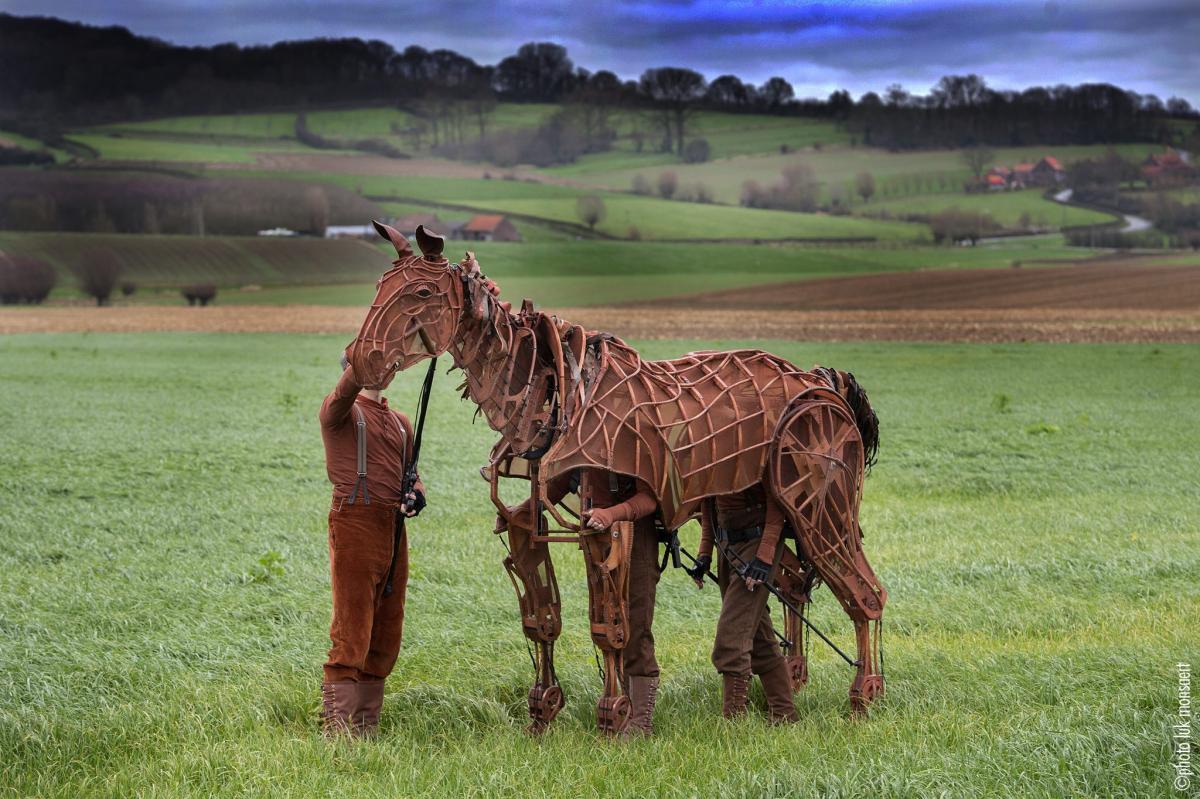


An exclusive new short story by the best-selling author of War Horse will be performed in Belgium to mark the centenary of Passchendaele, Third Battle of Ypres, Culture Secretary Karen Bradley has announced.
The work by Michael Morpurgo has been specially written for the national commemorations on Sunday 30 July. His live reading of the story will be accompanied by an appearance by the much-loved horse puppet Joey from the acclaimed National Theatre stage adaptation of War Horse, which comes to the New Theatre Oxford this Christmas from 13 December.
The commemorations will also feature extracts from The Wipers Times, the play by Ian Hislop and Nick Newman based on the satirical trench newspaper published by British soldiers fighting on the Ypres Salient.
Images from the War will be projected onto the town’s Cloth Hall, which was famously destroyed and later rebuilt. Recordings of interviews with First World War veterans and first-hand accounts from soldiers, nurses and loved ones will also be read out and projected onto the Cloth Hall.
Karen Bradley, secretary of State for digital, culture, media and sport said: “A century on from the horror of Passchendaele, the nation will come together to remember the sacrifice of those who were there. This battle has become synonymous with the horrific conditions of the trenches, and the futility of the war. It is important for us to commemorate and remember not only those who never returned home from the Western Front, but the families and the communities they left behind.”
The event will be preceded by the traditional Last Post ceremony which has taken place every evening at the Commonwealth War Graves Commission Ypres (Menin Gate) Memorial since 1928. As part of the ceremony, representatives of combatant nations will lay wreaths under the Gate.
On Monday 31 July, thousands of descendants of the men who fought, and those with a connection to the battle, will attend a ceremony at the Commonwealth War Graves Commission’s Tyne Cot Cemetery, the largest CWGC cemetery in the world, where almost 12,000 men are buried. Serving military personnel and descendants will read out letters and diaries from their ancestors as part of a service of remembrance to those who fought at Passchendaele.
Author Michael Morpurgo said: “All our yesterdays help us to comprehend our present. It is ever more important in this complex world for young people to know the roots of their history. We are inclined to take for granted our freedoms and our rights. It is easy to forget that so many of those who came before us, fought and died to defend the liberties we enjoy today. “We are now a hundred years on from the battle of Passchendaele, one of the most appalling battles of the First World War, in which thousands upon hundreds of soldiers suffered and died. It is a moment to reflect on their lives, and on the terrible nature of that war and of all wars, and on the importance of maintaining peace. They fought for our peace. That is what we must not forget, which is why we must continue to tell the story, to pass it on.”
Welsh poet Hedd Wynn, who was killed on the first day of Passchendaele, will be honoured in the commemorations, along with Irish poet, Francis Ledwidge, who was also killed in action on 31 July 1917. The National Youth Choir of Scotland will perform at all three commemorative events and around 100 graduates of youth empowerment programme National Citizen Service (NCS), aged 16 to 19, will be part of the delivery team at the commemorations.
Passchendaele began at 3.50am on 31 July 1917 when Gough’s Fifth Army launched their attack over a 15 mile front. Despite initial successes, the attack soon became bogged down and hampered by rain which turned the battlefield into liquid mud. By the end of the offensive, the Allied forces had sustained over 320,000 casualties. German losses are estimated to be between 260,000 and 400,000.
The Government’s four year First World War centenary programme will close in 2018 with services to mark the start of the 100 Days offensive - the Battle of Amiens - in August, and a special ceremony at Westminster Abbey to commemorate the centenary of Armistice. The centenary will also be marked with an expanded march past the Cenotaph following the traditional Remembrance Sunday service, and an event at the Commonwealth War Graves Commission St Symphorien Military Cemetery near Mons in Belgium. St Paul’s Cathedral will hold a special service of music and readings.
The Government’s cultural partner, 14-18 NOW, is also commissioning a series of arts projects to reflect the major themes of the centenary. This will culminate in a UK-wide event on Sunday 11 November, in which people across the UK will be invited to participate and reflect on how the FWW continues to shape our world today.